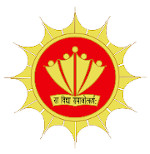
Bhartiy Samaj Vikas & Sanshodhan Santha’s
Khednagar, Tal- Karjat, Dist- Ahmednagar-414403
Affiliated to Savitribai Phule Pune University, Pune
Established in 2001 Accredited by NAAC at B+ Grade (with 2.51 CGPA)


Our institute may show following distinctive features:
The RMG College is the part of IISDR which has long standing for Rural Development Projects aiming at generating wealth by utilising land and human resources, which would be wasting otherwise. The institute is blessed by the active leadership of Dr. Kumar Saptarshi who was born in the village Khed itself. He has long experience of struggle against feudalism to minimise exploitation of human resources. Being an able social leader, he could get the support from common people not only in the district but also from all over Maharashtra. He has established affordable educational facilities to cater the needs of poor communities from about 20 to 30 villages around Khed. The college under accreditation is established on the campus admeasuring about 26 acres. It was rocky waste land. However, the same became green within 3years after 1979. The Loknayak Jaiprakash Narayan High School was started actually in the jungle of subabul, without any building or a small shed even, in 1984. As a natural vertical growth Dr. G. D. Saptarshi Jr. College was established. Most importantly, it is named after the first medical doctor, who chose to serve rural poor as per Gandhian ideas and started his mission in 1938 at Khed. Rashtrapita Mahatma Gandhi Mahavidyalaya is the one such institutes catering higher education to the communities coming from several villages from Alsunde (30km), Benavadi (20 km), Rakshasvadi (20km), Gneshvadi (6km), Bhambora (9km), Rajegaon (10km), etc. apart from the village Khed. Thus, the institute is being developed as educational hub catering non-professional education for those who cannot afford to migrate to the cities for higher education. This is the speciality of the institute in the context of our slogan, ‘education for all’.
The campus is green and it is confirmed by the auditing authority. It is quite visible in the form of several species of trees and bushes offering more sequestration than the carbon emission. This is not only carbon neutral but Oxygen surplus campus.
There are about 1000 school and college students and teachers in the campus. All of them follow the norms of waste management. Our staff and students practice waste segregation into compostable (wet) and non-compostable (dry). Compostable waste is managed on campus through projects like vermin-culture. Non compostable waste is sent to Khed gram panchayat facility.
The youths in present generation have to face the challenges put forth by present socio-political and economic system. The institute is focused on enabling the students to cope up with the situation through hands on projects. The projects are aimed at exposing the students to socially and environmentally aware business models. They include vermin- compost, fish farming, fodder cultivation, organic farming, algal fertilizer, etc. They are also trained technically with the help of short-term certificate courses. Such efforts are not only to understand the importance of environment but also to develop their mindsets as social entrepreneurs.
The students are constantly exposed to stalwarts in the field of social work, academics and business as they visit the campus. Thanks to our founder Dr. Kumar Saptarshi. Several persons reputed at national and international level have visited the institute just to have first-hand knowledge of socio-economic and political experiments going on under his leadership. Hon’ble Prime Minister Chandrashekhar, Hon’ble Baba Amte, Hon’ble S. M. Joshi, Hon’ble Nanbhau Embadwar (then Forest Minister), Hon’ble Anna Hazare, Professor Darmsiri, Professor Amarsinghe, Nilu Phule, etc. are the few names. It is said that good culture can be adopted or transferred by induction or Satsang. Youths studying in the college get the opportunity to meet such great personalities.
The biggest accomplishment of the institute is in its use of solar energy. The college has installed solar energy with net metering in 2017. Our electricity bill is zero and we have provided surplus electricity to the national network, for which MSDL has not paid. However, this process stops when electricity network is cut. This is loss of solar energy and we are persuading the policy makers to resolve the issue.
We follow norms of Mission LiFE, lifestyle for environment protection. This kind of behavioural aspect is taught to the students and they are enthused to work for developing awareness among their parents and general public. We have undertaken programmes like:
Groundwater depletion is the acute problem in the drought prone areas and also in other zones. For addressing the issue scientists and planners have suggested to develop rain water harvesting system. The piece of land owned by the institute has natural slope and it was potkaraba (inherently bad or culturable waste) as per land record. Some part of it was made cultivable because of tree plantation and rain harvesting. The well in the campus is now sufficient to supply water for the school, junior college, senior college and agricultural activities. Thus, we try to internalise worldwide issue of aquifer conservation. Our institute is led by the well-known scientists in the related field viz. Dr. Ashok Joshi, Dr. Urmila Saptarshi, Dr. Jyotiram More and Dr. Praveen Saptarshi.
The institute had mission to plant 10 million trees. The target was completed by establishing nursery. We developed a good supply chain to transport the saplings and reach out to the farmers and urban areas for plantation. Most importantly, the program has generated employment for rural poor. Just to continue our mission we have created Kumar Deorai in the campus alongside the farm pond by planting local species of trees.
It was great challenge to cope up with this difficult situation. The institute has shared its responsibility by providing space for patients, volunteering to supply food, drinking water, clothes, etc. to those in isolation. Several patients got discharge after recovery. Zero fatality was observed mainly due to oxygen rich campus.
Khed, Tal:Karjat, District: Ahamadnagar 414403
Made with ❤ by Yashaswi Bhavah | 807-00-11-222 | WhatsApp | Website | Email